Big strides have been made of late in the fight for equality and fingers crossed that a significant breakthrough is on the horizon! I am of course referring to and in full support of the “Black Lives Matter” movement. I made this beautiful Yudane charcoal bread as a way of getting my humble two cents in.
You wouldn’t be able to tell the difference if you closed your eyes and relied solely on your tastebuds. Just like people, we come in different shapes, sizes, and colour, but we are all the same inside. This Yudane charcoal milk bread is soft, moist and super delicious. Apart from the intense black colour, I would say it is rather similar to my Tangzhong milk bread. If anything, it only adds more character, more style, more attitude.
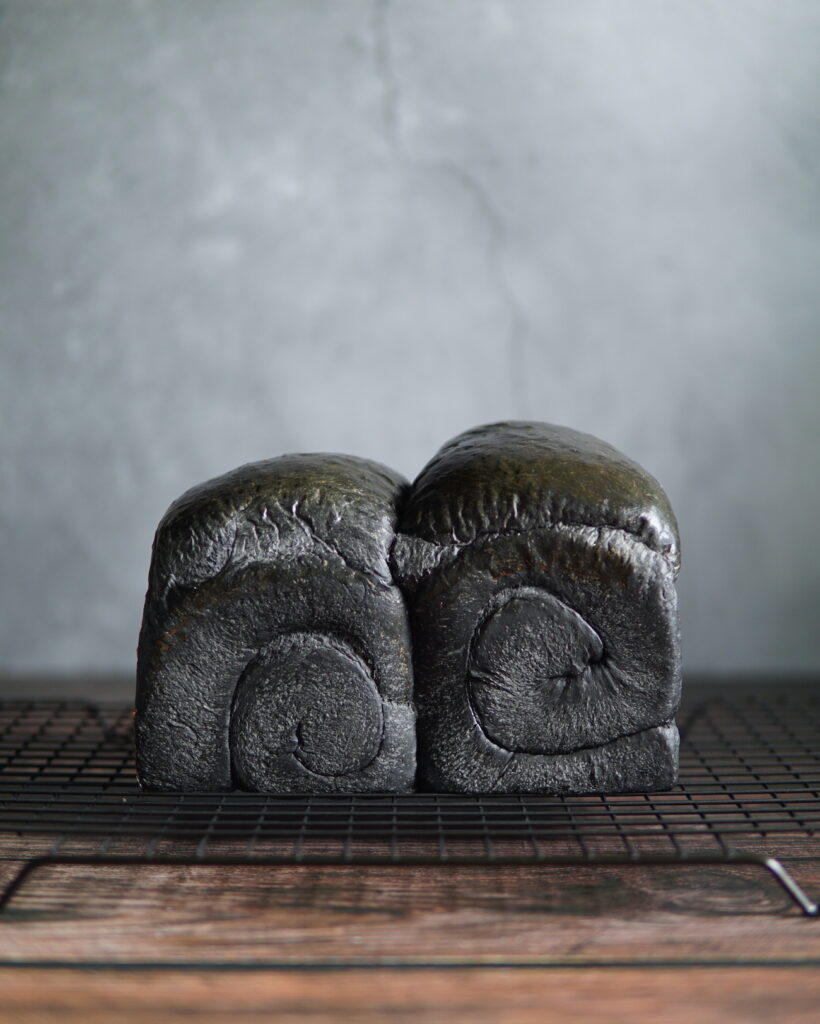
As always, the secret to a soft and fluffy bread is the addition of water roux. If you are still unfamiliar with this, it is a method of pre-cooking a small portion of the dough either by cooking or scalding.
Cooking the flour causes the starch to gelatinize. This produces the soft and moist bread texture, that also enables the bread to last longer.
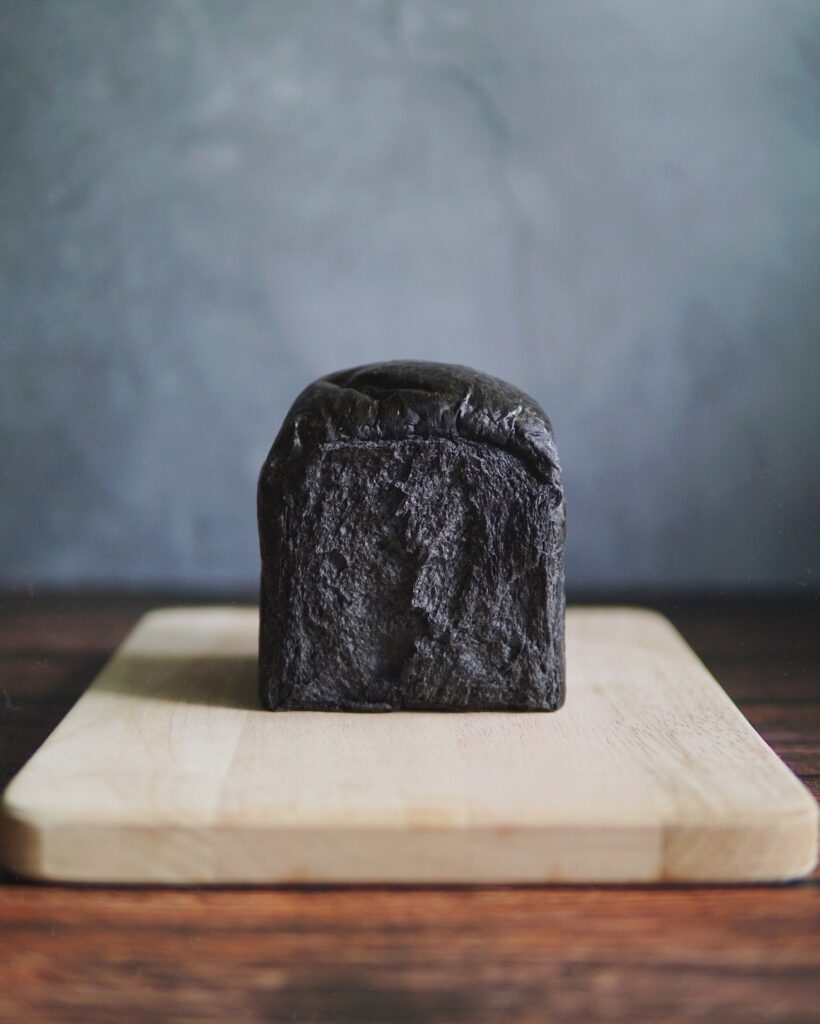
I find that charcoal bread gives a better contrast of colours with your sandwich fillings, making it visually more appetising!
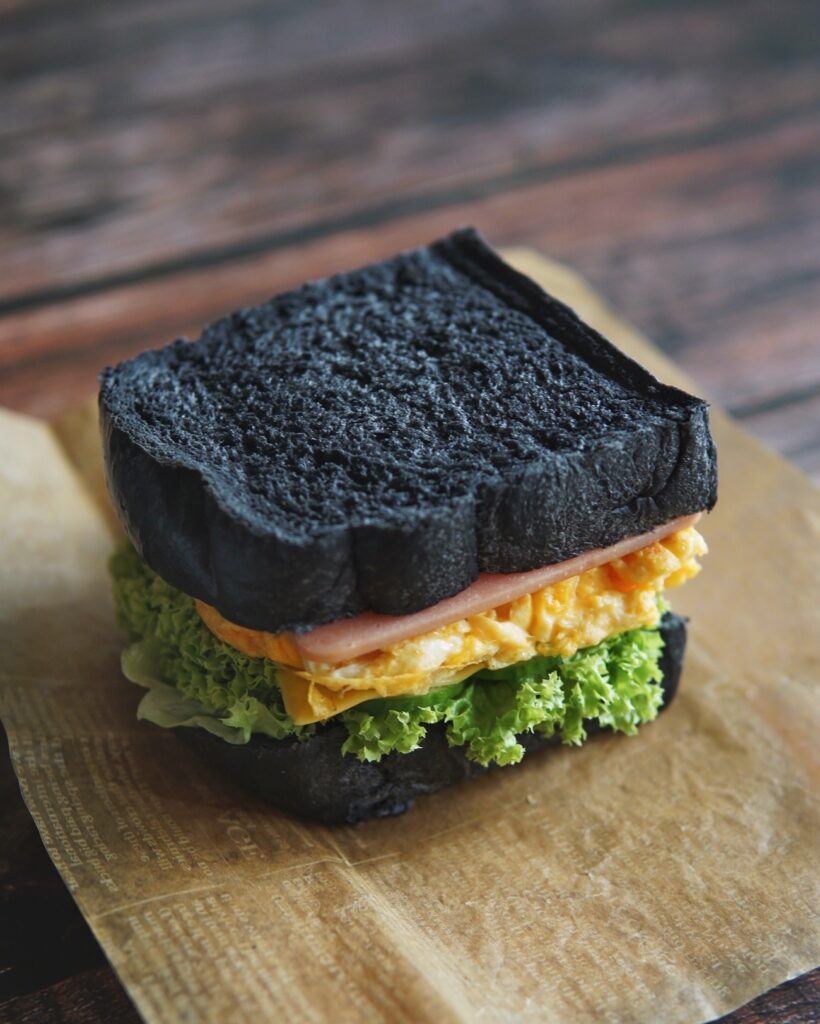
Staying true to this Japanese theme, I whipped up some eggs for my brekkie sando. I made Japanese tamago that is slightly sweet, silky and tender. A touch of mirin, sugar, salt was added into lightly beaten eggs and cooked over low heat. I feel mayo goes perfect with this; throw in some crisp lettuce, cucumber, juicy tomato and a slice of ham and you have yourself a simple, wholesome sandwich combo for breakfast!
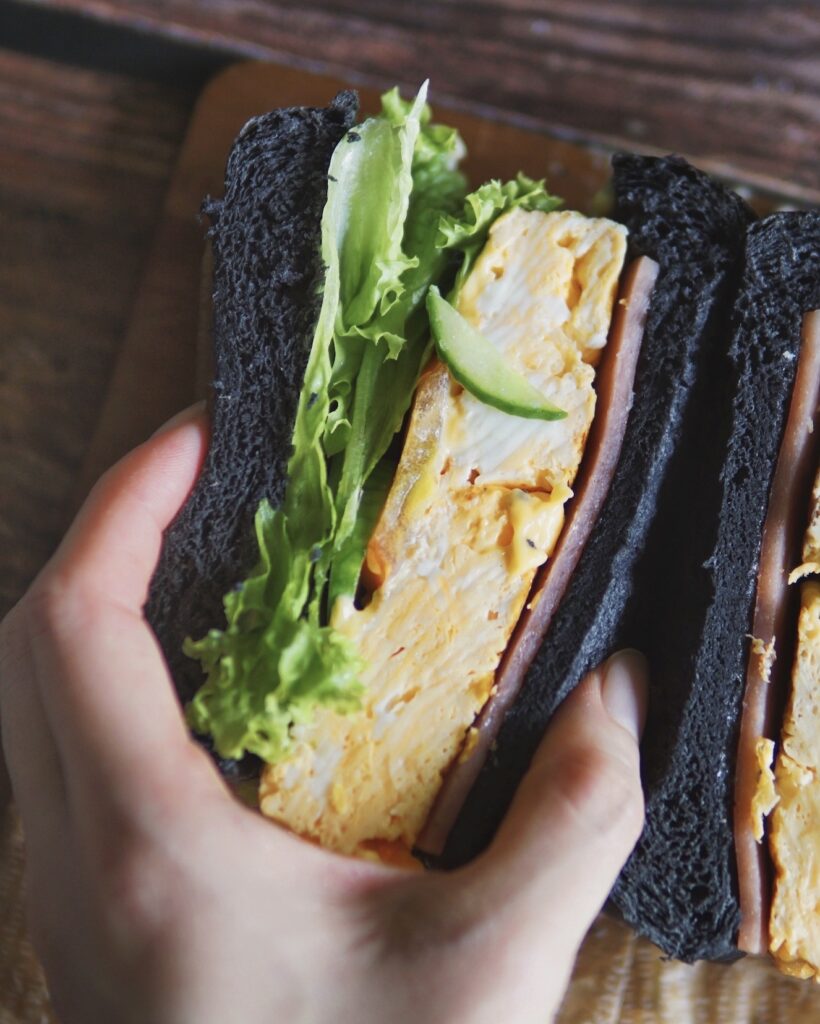
Yudane Charcoal Bread
Ingredients
Yudane Dough
- 60 g high protein bread flour
- 55 g boiling water
Main Dough
- 240 g high protein bread flour
- 3 tsp bamboo charcoal powder
- 1¼ tsp dried instant yeast
- 1½ tbsp brown sugar
- 1⅛ tsp salt
- 160 g fresh milk
- 12 g butter
Instructions
Yudane Dough (best if prepared overnight)
- Add bread flour to a bowl, pour boiling water over, and mix well with spatula or spoon. Cover with a cling wrap sticking onto the surface and refrigerate overnight. Remove from the fridge 30 minutes before using to return yudane to room temperature.
- You can also make yudane at least 4 hours before using, by leaving it at room temperature. However do note that the longer you allow the yudane to rest, the better your bread will turn out.
Main Dough
- Return yudane to room temperature 30 minutes before using.
- Place all ingredients except butter into Thermomix bowl and knead 4 minutes.
- Add butter, knead 1 minute.
- Transfer dough to pastry mat, shape into ball let proof in a warm place covered loosely with cling wrap/damp towel until doubled in size (approx. 45-60 minutes).
- Punch down dough to deflate. Divide dough into 2 equal portions and roll into a round shape. Let rest for 10 minutes.
- To shape each mini loaf, flatten a ball into a long oval shape. Fold 1/3 from right edge to the middle and press. Fold 1/3 from left edge to the middle and press lightly. Roll it out slightly and roll into a cylinder.
- Arrange dough logs, seam side down in a bread loaf tin (I am using a 450g Pullman Loaf Tin 8x4x4") and let proof for approx 40 minutes until dough fills up 80% of the tin. Ideally, the best temperature for 2nd round proofing is at least 30°C to 38°C. On days when it's cold, you can heat up a cup of water in the microwave for 30-40 seconds then proceed to leave your dough inside the microwave to rise. During last 15 minutes, preheat oven to 190°C.
- Bake for 25-30 minutes at 180°C until golden brown. Remove milk bread from tin and allow to cool completely on a cooling rack for at least an hour before slicing and serving.
Notes
Few Things to Note
When it comes to bread making, there are many factors that will influence your dough and the end product. Recipes should be used as a guide, as you familiarize yourself with the process and dough.
For instance, your dough may require extra kneading time depending on the flour and its protein content. The method used to knead also needs to be taken into account as some machines work the dough quicker, whilst others may require a bit more kneading time.
Temperature and humidity plays a big part in how your dough rises. The amount of time required to proof your dough also varies depending on where you’re based at. For my second proofing, I usually heat up a cup of water in the microwave for 45 seconds, then proceed to leave my dough inside the microwave to rise for 25-30 minutes.
It’s also very important to try to get to know your oven, as every oven is different. My oven heats up quickly so when a recipe calls for 180°C, I sometimes drop it down to 160-170°C. Keep an eye out as the bread is baking. Adjust either the baking temperature or duration according to how your oven behaves.
Have you tried this recipe?
IF YOU MADE THIS RECIPE, I’D LOVE TO SEE HOW IT WENT!
TAG ME ON INSTAGRAM @THEBAKEANISTA SO I CAN HAVE A LOOK AND RE-POST ON MY IG STORIES!

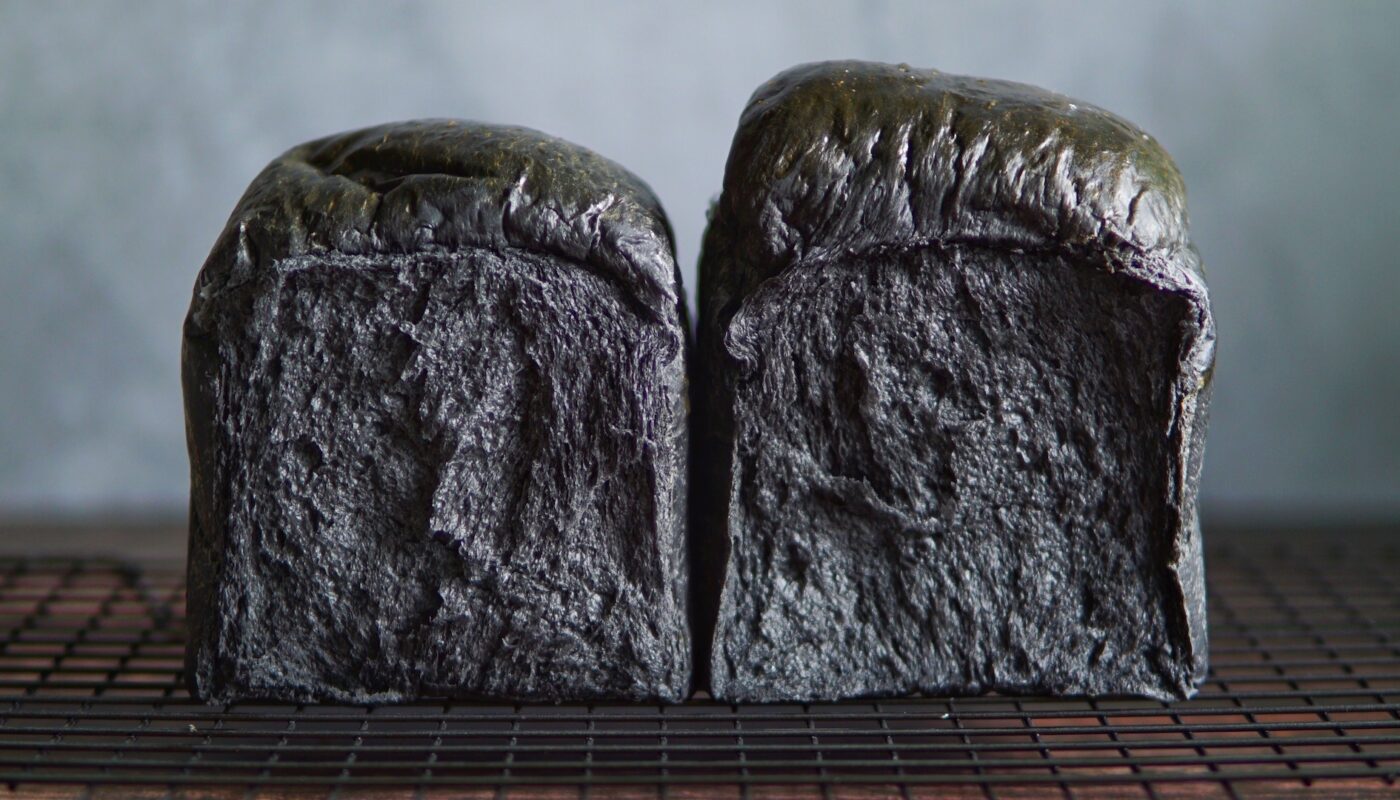
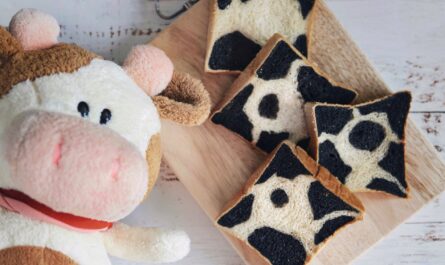
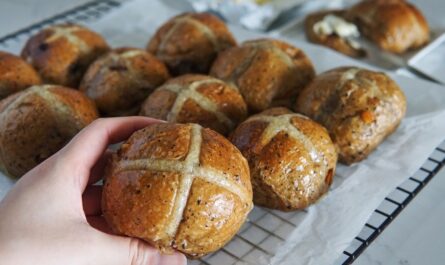
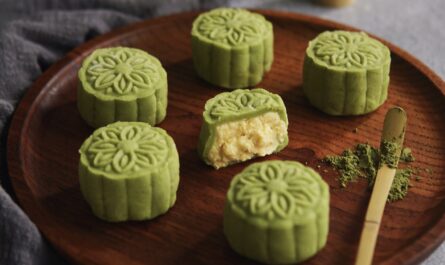
Wow, black and beautiful! You do bake aesthetically looking bread!!
But I was wondering if I could add pandan juice instead of charcoal powder so that I have a green and fragrant loaf of bread? Perhaps I have to put in less liquid? Your input would be greatly appreciated. 😊
Thank you Doreen for your lovely words! Pandan juice is a wet ingredient and Charcoal Powder is dry ingredient – meaning they are two very different ingredients. I would have to try first before I am able to advise the amount of pandan juice to include. I do have a different Pandan Loaf bread coming up soon, I’ll work to get that up ASAP. 🙂
Looking forward to your pandan loaf! 🙂 Renewed thanks!
Cannwe make this bread in a breadmaker? If yes can you advice please. Many thanks
Yes you can, if you have a soft bread mode – that’ll be best.
Can I use matcha powder to replace charcoal powder?
Yes of course you can! I also have a matcha loaf recipe here if you wish to check it out: https://thebakeanista.com/how-to-bake-checkered-matcha-milk-bread/
Can I use the tang Zhong dough method instead of yuDane dough method to make charcoal bread ? I have a thermomix so I felt using the same tang Zhong dough to make this bread.
Yes of course. You can just add charcoal to the dough along with the flour.
Hi, since ive not seen nor used charcoal other than good old southern barbecues :o), Im Not sur HOW to purchase a charcoal powder or does it matter what type or brand, since it will probably be bought on line? My search results didnt say which kind to choose.
Hi there, I suggest getting charcoal powder from bakery supply stores to ensure they are food grade products.